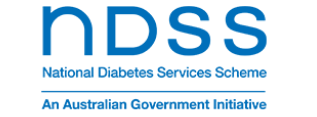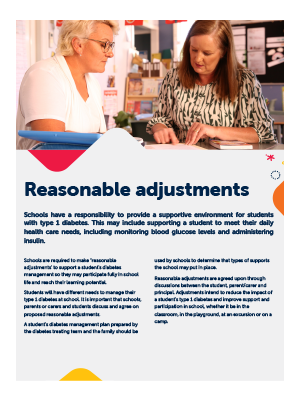In order to create a supportive environment for students with type 1 diabetes schools may be required to make ‘reasonable adjustments’ for these students
The diabetes management plan plays an important part in helping schools determine the changes or adjustments that may need to be made for students with type 1 diabetes.
Reasonable adjustments are the supports and actions that the school and parents or carers agree the school will make to ensure that students with type 1 diabetes can best manage their condition and don’t miss out on school opportunities.
This includes practical day-to-day measures that the school’s designated staff will oversee. It may be as simple as allowing a student to eat during class time or more complex, such as supervising or administering insulin.
The school and parents or carers will determine what these reasonable adjustments are. Not every student will need the same adjustments and not every school will be able to make every adjustment – this will need to be discussed between the school and the parent or carer.
Schools are required to make reasonable adjustments, as reflected in the diabetes management plan, to help ensure students with type 1 diabetes are not disadvantaged or discriminated against in the school environment. What is considered reasonable depends on a range of factors including the resources available to the school making the adjustments.
Examples of reasonable adjustments that schools might adopt include:
- additional communication between school staff and the student’s parents or carers
- supporting the use of continuous glucose monitors in the school setting, including allowing students to use mobile devices to sync with their continuous glucose monitors
- supporting the use of insulin pump therapy for the administration of insulin
- school staff supervising or administering insulin by way of injection or via pump
- allowing students to access food during class or during other activities
- allowing students access to their medical equipment during class time
- providing additional breaks to allow students to check their blood glucose levels and for the administration of insulin
- allowing students to have extra toilet breaks
- providing an appropriate area the student can use to test their blood glucose and/or administer their insulin (if they wish to use it) and
- giving extra time or special consideration on exams and assignments.
Schools may require some input from the clinical treating team to help clarify aspects of the diabetes management plan and determine the actions to take when the school consults with the student and their parents or carers to establish what adjustments might be required to support the student’s needs at school.
A students’ support needs change over time, reasonable adjustments must also change over time.










